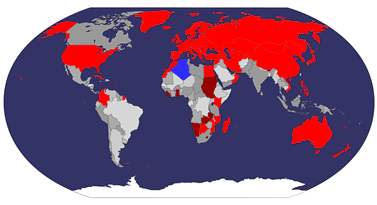It is not surprising that New Zealand has elected to have an 18-month examination period and wishes to receive Individual Fees.
New Zealand's accession also makes it clear it will not extend to Tokelau unless requested to do so by that territory.
The United Nations is keen to see Tokelau - among 16 "non-self governing territories" - move towards independence. To move off on a political tangent, it seems decolonization is being forced. Tokelau has a tiny population (approximately 1,400) and has turned down self-determination in two referenda.
The Cook Islands and Niue are sovereign countries in free association with New Zealand. Their situation is not perfectly clear to me but it seems they could join WIPO and the Madrid Protocol in their own right if I cite this document:
"The Cook Islands and Niue maintained the status of self-governing territories in free association with New Zealand. In view of this special relationship with New Zealand, which discharged the external affairs and defense of the Cook Islands and Niue, neither the Cook Islands nor Niue could invoke the “all States” clause to participate in treaties deposited with the Secretary-General unless specifically invited to participate in a treaty. However, the responsibility of the Cook Islands and Niue to conduct their own international relations and particularly to conclude treaties has evolved substantially over the years: the Cook Islands became a member of WHO in 1984, of FAO in 1985, of UNESCO in 1985, and of ICAO in 1986; Niue became a member of UNESCO in 1993 and of the WHO in 1994."
This is a moot point at the moment as neither the Cook Islands or Niue have local trade mark legislation in place (both are 'Cautionary Notice countries'). As Common Law countries they would need to enact legislation to reflect Madrid Protocol membership and make International Registrations enforceable. Saying that, this has not stopped many African countries, for example, from joining up.
New Zealand joins Australia as a Madrid Protocol member in the region - and means the two dominant economic powers of Oceania can now be easily included in an International Registration. (Incidentally, Australia has recently requested to receive increased Individual Fees.) Also in this region, the American territories of American Samoa, Guam and the Northern Mariana Islands would be considered a part of a designation of the United States in a Madrid Protocol application (although you can register locally in American Samoa and Guam). Likewise, the French possessions of French Polynesia, New Caledonia and Wallis and Futuna would be covered by a Madrid Protocol or Agreement designation of France.
The updated worldwide Madrid Protocol situation, from 10 December 2012, will look something like this.
Madrid Protocol World Coverage

Map includes Kosovo and South Sudan (as parts of Serbia and Sudan respectively) but these are not covered by the Madrid Protocol
 Member State
Member State  Madrid Agreement only member
Madrid Agreement only member  Questionable enforceability
Questionable enforceability 